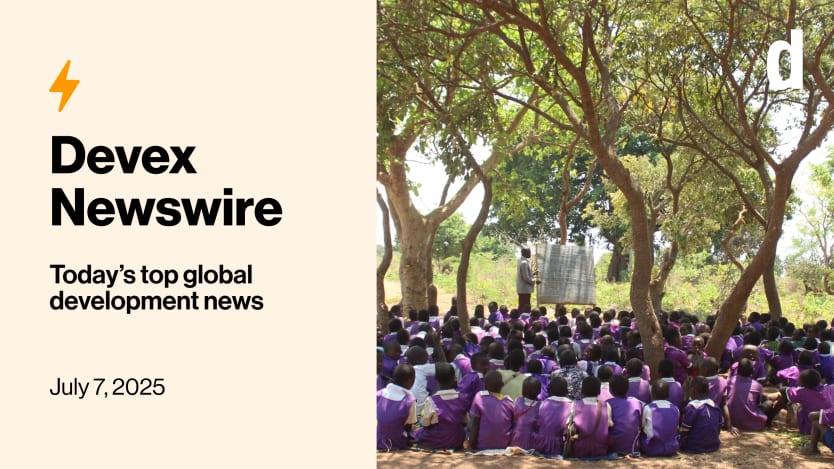Devex Newswire: IMF austerity criticized for gutting Africa’s public services

Austerity policies pushed by the International Monetary Fund are hollowing out African health and education systems, says a new report.
Also in today’s edition: The sorry state of U.N. jobs, and hopes for a transition away from PEPFAR funding.
+ Happening soon at 9:30 am ET: We’ll have an insightful conversation with the Segal Family Foundation. Tune in as we delve into their unique model and grantmaking strategy, which places trust and proximity squarely at its center. This is a must-attend for anyone interested in the future of philanthropic giving. Save your spot now.
Debt sentence
A new ActionAid report warns that IMF-driven austerity is gutting public health and education systems across Africa — with six countries, including Malawi and Nigeria, paying a steep price for prioritizing debt over people, Devex contributing reporter Madalitso Wills Kateta writes.
“Austerity policies borrowed from a 1980s playbook have set us years back in the fight against inequality,” says Fati N’Zi-Hassane, director of Oxfam in Africa. The result? Overcrowded classrooms, vanishing teaching materials, and underpaid teachers footing the bill themselves. In Malawi, some teach over 200 students with no supplies.
Health care isn’t faring any better. In Nigeria, only 4% of national revenue goes to health — while 20.1% goes to foreign debt. “This is not only absurd but unsustainable,” says ActionAid’s Andrew Mamedu. In Kenya, women are giving birth at home and traveling miles for basic vaccines.
Across the six countries, rising costs, weak infrastructure, and donor pullouts — such as USAID’s $350 million withdrawal from Malawi — are deepening the crisis.
The IMF defends its stance, with managing director Kristalina Georgieva saying members remain committed to addressing global debt vulnerabilities.
But civil society wants a full rethink. Groups across Africa are calling for debt cancellation, grant-based financing, and new rules that shift power away from the IMF to more democratic institutions.
“We need a system that works for everyone, not just the wealthy few,” says Mulayi Muni of Kenyan civil society organization The Institute for Social Accountability.
Read: How Africa’s schools and hospitals are paying the price of IMF austerity
+ Debt was a topic of discussion at last week's Fourth International Conference on Financing for Development. We have a special edition newsletter hitting your inbox soon that will deliver the essential insights and key takeaways from the conference, including the latest on debt discussions. Stay informed!
UNwelcome news
Since the Trump administration froze U.S. foreign aid in January, U.N. hiring has plunged more than 43%, according to a new Devex report put together by my colleague Raquel Alcega.
Some agencies are in particular free fall: UNHCR job postings dropped 83.4%, while the World Health Organization slashed postings by 81.1% after the U.S. announced its withdrawal from the agency. “I have never, ever seen such a challenge due to the lack of resources, cuts, freezes, and uncertainty,” says UNHCR High Commissioner Filippo Grandi.
It’s not just fewer jobs — it’s a total shift in how the sector works. Long-term consulting gigs are down nearly 67%, and full-time staff positions have fallen by more than 44%. Short-term contracts are now the norm.
Jordan, Ukraine, and Ethiopia are all hard hit. Even the U.S. saw a 36% drop in U.N. job ads.
A few agencies, including the International Organization for Migration and UN-Habitat, are posting more roles — though mostly short-term. IOM is up 70%, but cutting back on long-term opportunities.
Read: UN job postings are down 43%. Where are the remaining opportunities?
At a crossroads
Budget cuts are looming over PEPFAR, the world’s largest bilateral program to address HIV/AIDS, and experts hoping to avoid disaster are urging a careful handoff to partner countries — without undoing two decades of progress, Devex Senior Editor Rumbi Chakamba writes.
At a recent Devex Pro Briefing, Dr. Mark Dybul, one of PEPFAR’s original architects, said he believes about a dozen countries could wean off of PEPFAR support fully within a few years — but others “will need five, seven [years], maybe even a little bit longer,” and some may always need outside help.
Jennifer Kates of KFF said existing tools — such as graduation criteria and co-financing — can guide transitions, but she warned: “Unfortunately, given what’s happened in the last couple of months, we are in a crisis situation, and that’s not good for transition for anything, because you can make rash decisions.”
“In places like in Africa and other regions, there’s already a shift happening in more local ownership and regional leadership,” said Dr. Jirair Ratevosian of Duke University, stressing this isn’t just technical. “They’re actually moving to take more control over their policies and procurement policies.”
But Asia Russell of Health GAP pushed back: “Many countries are unwilling to accept the epidemics they have, unwilling to embrace science, unwilling to embrace human rights, and to step aside from colonial artifacts of criminalization of LGBTQ and other highly vulnerable populations.”
With USAID being dismantled, Russell fears the loss of institutional know-how. “If on Day 1 of implementation of whatever the State Department’s new shape comes and that expertise is not there, then even with full funding, what [will] the awards look like?” she asked. “How are they managed? How is impact measured and tracked, and stood up? … It’s terrifying that these questions are not answered.”
Watch: What should a responsible PEPFAR transition look like? (Pro)
+ Curious about the insights that drive global development? Experience the power of Devex Pro with a 15-day free trial. Explore expert analyses, unlock hidden funding opportunities, connect with key players at exclusive events, and access a wealth of knowledge you won't find anywhere else.
Cheap shots
Big news in the fight against malaria: the price of RTS,S — the world’s first malaria vaccine — will drop to less than $5 per dose by 2028 in endemic countries, thanks to a pledge from manufacturers GSK and Bharat Biotech.
The timing isn’t accidental, Devex Senior Reporter Sara Jerving writes. This announcement landed alongside last month’s replenishment event for Gavi, the Vaccine Alliance. Over the next five years, Gavi plans to help vaccinate 50 million children against malaria via the recommended four-dose regimen — and many countries will pay just $0.20 per dose.
“Sustained affordability is essential to ensuring that the progress we’ve made in malaria control is not only maintained, but accelerated,” says Dr. Kwaku Poku Asante of Ghana’s Kintampo Health Research Centre.
An RTS,S pilot program reduced all-cause child mortality by 13% and hospitalizations by 22%, according to WHO trials in Ghana, Kenya, and Malawi. But experts stress it’s not a silver bullet — bed nets, chemoprevention, and treatments are still key.
By April, 19 African countries had introduced malaria vaccines into child immunization. Gavi-backed rollout of RTS,S will reach 12 more countries by year-end, as demand continues to surge.
Meanwhile, GSK is working on a next-gen vaccine that offers stronger protection, and a second WHO-recommended vaccine, R21, is already on the scene — priced between $2 and $4.
Read: Price of first malaria vaccine to be slashed by more than half
+ For more content like this, sign up to receive Devex CheckUp, our free weekly newsletter that provides front-line and behind-the-scenes reporting on global health.
In other news
Two staff members of the U.S.- and Israel-backed Gaza Humanitarian Foundation were injured following an attack on one of its distribution centers on Saturday. [France 24]
The U.N. has deployed teams to help fight wildfires that have been spreading in northwestern Syria, displacing thousands and destroying agricultural lands and vital infrastructures. [AP]
Sign up to Newswire for an inside look at the biggest stories in global development.
Search for articles
Most Read
- 1
- 2
- 3
- 4
- 5








